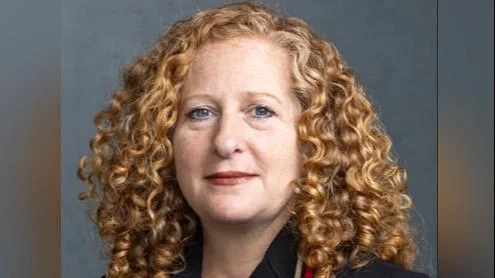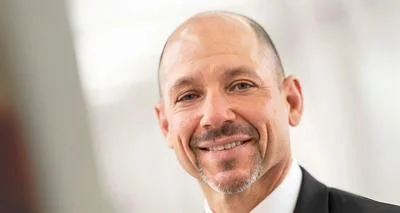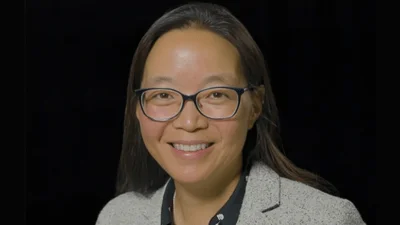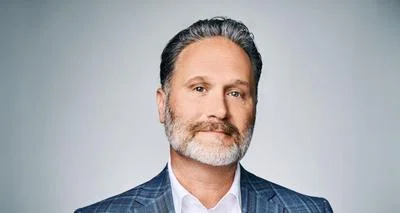Jennifer Mnookin Chancellor | Official website
Jennifer Mnookin Chancellor | Official website
Faculty and staff explore state’s rivers, culture and more in Wisconsin Idea Seminar
June 14, 2024
By Catherine Reiland
Bill Quackenbush, tribal historic preservation officer of the Ho-Chunk Nation, and Dennis Lloyd, director of the University of Wisconsin Press and participant of the 2024 Wisconsin Idea Seminar, extended their hands to help seminar participants cross a rocky bend on the group’s walk through Maa Wákąčąk, sacred Ho-Chunk land at the foot of Wisconsin’s Baraboo hills.
After learning how to create a warp with cattails, the Wisconsin Idea Seminar participants began to weave, methodically crossing cattail fibers to create a small mat while discussing and reflecting on their project. “Protecting the water is to care for the cattails and the bulrushes,” Melanie Tallmadge Sainz, an artist and enrolled member of the Ho-Chunk Nation, had told them at the start of the workshop. It was an invitation to consider the interconnectedness of land, people, and water.
The workshop was held at Little Eagle Arts Foundation’s studio in Maa Wákąčąk—sacred land for Ho-Chunk people—about ten miles south of Baraboo. The participants had just visited the Ho-Chunk Nation’s House of Wellness to learn about community-driven healthcare and then walked along a spring-fed stream at the foot of the Baraboo Range to experience land restoration efforts led by the Ho-Chunk Nation on what was once the site of Badger Army Ammunition Plant.
Weaving with an aquatic plant marked the beginning of a 500-mile journey where 41 University of Wisconsin–Madison faculty and staff spent a week as students of Wisconsin life. Their teachers were more than fifty collaborators across various fields. The annual five-day journey offers faculty and staff firsthand insights into social and cultural contexts shaping many Wisconsin students' lives. Themes included health, healing, creative placemaking, K-12 education, incarceration, dairy industry dynamics, and interactions between rivers and communities.
The state’s rivers structured their exploration: Mississippi River, Wisconsin River, Kickapoo River, Trempealeau River, and Kinnickinnic River. In Kickapoo Valley Reserve in southwest Wisconsin's non-glaciated landscapes, participants crossed Bridge 13 over Kickapoo River—a metal truss bridge refurbished in collaboration with Ho-Chunk Nation.
They met health practitioners supporting future professionals through collaborations with UW–Madison’s Native American Center for Health Professions. At UW–La Crosse they learned about integrating community engagement into undergraduate research experiences. Health practitioners from La Farge Medical Clinic emphasized cultural humility and trust-building with Amish communities.
In Arcadia they engaged with K-12 educators who value partnerships with local colleges to support students. Stevens Point-area food producers shared small-batch products like hydroponic lettuce and maple syrup at Bukolt Lodge on Wisconsin River banks.
At Mitchell Street Arts in Milwaukee's south side they learned about storytelling's power for formerly incarcerated individuals working towards stronger communities. At Alice’s Garden urban farm on Milwaukee's north side they harvested herbs while appreciating local abundance.
The seminar concluded among grandmothers committed to community health who believe caring for Wisconsin waters equates to caring for everyone. They frequently met proud UW–Madison alumni contributing Badger spirit locally.
Participants shared their perspectives:
Daniela Drummond-Barbosa (Professor), Samara Frame (Advancement Manager), Meenu Verma (Associate Director), Fran Vavrus (Vice Provost), Jeanette Comstock MD (Assistant Professor), Morgan Jerald (Assistant Professor), Jing Wang (Assistant Professor), Erla Heyns (Dean).
The program is supported by UW–Madison schools/colleges and Evjue Foundation—the charitable arm of Capital Times underwriting since 1985—with contributions from Rachel Niles (Office of Provost) & Kelly Copolo (Division Teaching & Learning).
###






 Alerts Sign-up
Alerts Sign-up